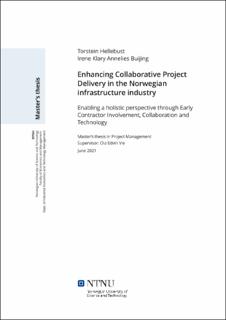| dc.contributor.advisor | Vie, Ola Edvin | |
| dc.contributor.author | Buijing, Irene Klary Annelies | |
| dc.contributor.author | Hellebust, Torstein | |
| dc.date.accessioned | 2021-10-05T17:21:29Z | |
| dc.date.available | 2021-10-05T17:21:29Z | |
| dc.date.issued | 2021 | |
| dc.identifier | no.ntnu:inspera:85316077:85319710 | |
| dc.identifier.uri | https://hdl.handle.net/11250/2787872 | |
| dc.description.abstract | Infrastruktur industrien omsett årleg for fleirfaldige milliardar. På tross av dette vert den ofte kritisert for lav effektivitet og høge feilrater. Som eit svar på dette har det dei siste åra oppstått ei rekke nye prosjektgjennomføringssystem. I denne masteroppgåva undersøker vi utfordringane knytt til desse systema. Forskingsspørsmålet for oppgåva er:
Korleis kan norske infrastruktur prosjekt løyse utfordingane knytt til prosjektgjennomføring i samspel (Collaborative Project Delivery).
For å identifisere utfordringane knytt til prosjektgjennomføring i samspel, utførte vi ei litteraturstudie. Under arbeidet med denne oppdaga vi at litteraturen mangla ei god definisjon for dette konseptet, då fleirtalet av forfattarar adressearar enkelt system, som t.d. IPD, Alliancing, etc. For å mogleggjere diskusjonar på tvers av systema laga vi ein definisjon som omfattar fleire typar prosjektgjennomføring i samspel. Definisjonen er basert på ei samanlikning av dei ulike systema og lyder slik: prosjektgjennomføring i samspel er system som søkjer å effektivisere prosjekt gjennom tidleg involvering av entreprenør, samspel mellom prosjektdeltakarane og bruk av teknologi for å forbetre kommunikasjon og samarbeid. Systema kan nyttegjere særeigne kontraktar, men dei kan og være tilpassa lokale innkjøpslover og kontraktstandarar. Litteraturstudiet peika og på at tidleg involvering av entreprenør, samspel og teknologi var avgjerande for å lukkast med samspelsprosjekt. Basert på dette utvikla vi ECT modellen, som beskriv dei mest framtredande utfordringane ved prosjektgjennomføring i samspel, gjennom eit sett med teoretiske proposisjonar.
Etter litteraturstudiet gjennomførte vi en kvalitativ casstudie der vi såg nærare på to infrastrukturprosjekt i Noreg. Datainhentinga bestod av semistrukturerte intervju med fem deltakarar frå kvart prosjekt. Dataa vart koda ved hjelp av Gioia metoen. Vidare vart dei brukte til analysere dei teoretiske proposisjonane og til å evaluere og komplimentere ECT modellen. Studien vår framhevar har tre hovudfunn. Det første er at litteraturen fokuserer for mykje på byggherrerolla, og for lite på entreprenørrolla. Vidare fann vi at litteraturen langt på veg seier at trening er den viktigaste suksessfaktoren mtp. teknologibruk. Funna våre tilseier at det er minst like viktig at det etablerast eit rammeverk for korleis ein skal bruke teknologien til å framme samspel. Til sist fann vi at teorien foreslår ei rekke individuelle tiltak for å for å framme samspel. Våre funn tilseier at tiltaka gjev best effekt dersom dei settast i samanheng og innførast som ei pakke. Konklusjonen på studien er at ein heilheitleg innføring av ECT modellen er nødvendig for å løyse utfordringane knytt til prosjektgjennomføring i samspel. For styrke å ECT modellen anbefaler vi å gjennomføre ei liknande studie i ein annan kontekst og at ein ser nærare på bruken av fasislitatorar. | |
| dc.description.abstract | The multi-billion infrastructure industry is often criticized due to low efficiency and high failure rates. To remedy this situation a set of new collaborative project delivery systems have appeared. In this thesis we aim to examine the challenges related to such systems. This is done through answering the following research question:
How can Norwegian infrastructure projects overcome the challenges related to collaborative project delivery?
To answer this question, we performed a literature study to identify the challenges related to collaborative
project delivery. However, we found that the theory was lacking a proper definition for this concept as authors usually address specific systems like Integrated Project Delivery, Alliancing, etc. Thus, in order to discuss CPDS as a concept we saw the need for a definition that covered all of these systems. Therefore, we formulated the following definition based on a comparison of these systems: A collaborative project delivery system is a system that aims to improve the efficiency of projects through early contractor involvement, collaboration between participants and utilizing technology to enhance communication and collaboration. They may utilize specialized contracts, but can also exist within existing standards of local procurement laws.
Subsequently, we found that the elements, Early Contractor Involvement, Collaboration and Technology (ECT) are the most important factors. So we created the ECT framework, which addresses the different challenges related to collaborative project delivery through a set of theoretical propositions.
Next, we performed a qualitative case study where we examined two Norwegian Public Infrastructure Projects. We conducted semi-structured interviews with different participants with a total of five informants from each project, to collect data. We coded the data with the Gioia method where after we analyzed it. We used the data to examine our propositions and to evaluate and complement our ECT framework. There are three major findings from our research. The first is that the existing theory emphasizes too much on the owner's role and neglects the contractor's role. Our second finding is that collaboration can be established by holistic use of various measures to enhance collaboration, which deviates from the existing theory which focuses on individual implementation. Finally, the theory has an extensive focus on training with technology, whereas our study shows that establishment of a framework on how to use the technology collaborative is equally important. The conclusion of our study is that to overcome the challenges of a CPDS, a holistic implementation of the ECT framework is necessary. To strengthen the ECT framework, we suggest that similar research is performed in other context and that the use of a facilitator is examined further. | |
| dc.language | eng | |
| dc.publisher | NTNU | |
| dc.title | Enhancing collaborative project delivery in the Norwegian infrastructure industry
Enabling a holistic perspective through Early contractor involvement, Collaboration and Technology | |
| dc.type | Master thesis | |
